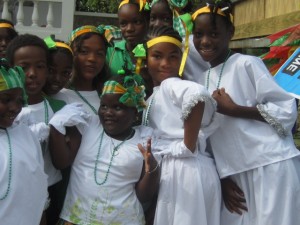St. Patrick's in Montserrat
/  On the tiny, volcanic island of Montserrat, St. Patrick's Day gets a full week of celebration with festive feasting, fishing, hiking and lots of music. There's a Goat Water Sale commemorating the traditional stew made with goat meat, and a "slave feast" recalling the island's history of sugar and tobacco plantations worked by slaves.
Sometimes people are shocked to learn that the Irish who came to Montserrat in the mid-17th century actually owned slaves. Why would they who had been enslaved and treated live vermin by the English condone slavery in their own plantations? Those who were lucky enough to find land there that did not already belong to the English were eager to work it, but they quickly learned that because there was so much work to be done and most of it by hand, there was no way to operate at a profit without free labor.
On the tiny, volcanic island of Montserrat, St. Patrick's Day gets a full week of celebration with festive feasting, fishing, hiking and lots of music. There's a Goat Water Sale commemorating the traditional stew made with goat meat, and a "slave feast" recalling the island's history of sugar and tobacco plantations worked by slaves.
Sometimes people are shocked to learn that the Irish who came to Montserrat in the mid-17th century actually owned slaves. Why would they who had been enslaved and treated live vermin by the English condone slavery in their own plantations? Those who were lucky enough to find land there that did not already belong to the English were eager to work it, but they quickly learned that because there was so much work to be done and most of it by hand, there was no way to operate at a profit without free labor.
A 1995 white paper by William E. West chronicles what happened to the Irish during that period:
In 1641, Irelands population was 1,466,000 and in 1652, 616,000. According to Sir William Petty, 850,000 were wasted by the sword, plague, famine, hardship and banishment during the Confederation War 1641-1652. At the end of the war, vast numbers of Irish men, women and children were forcibly transported to the American colonies by the English government.7 These people were rounded up like cattle, and, as Prendergast reports on Thurloes State Papers8 Pub. London, 1742, "In clearing the ground for the adventurers and soldiers the English capitalists of that day... To be transported to Barbados and the English plantations in America. It was a measure beneficial to Ireland, which was thus relieved of a population that might trouble the planters; it was a benefit to the people removed, which might thus be made English and Christians ... a great benefit to the West India sugar planters, who desired men and boys for their bondsmen, and the women and Irish girls... To solace them."9
 The book Sugar and Slaves by Richard S. Dunn covers the story in vivid detail and informed much of my research for Sharavogue. Another book, If the Irish Ran the World, details the Irish experience with slavery.
The book Sugar and Slaves by Richard S. Dunn covers the story in vivid detail and informed much of my research for Sharavogue. Another book, If the Irish Ran the World, details the Irish experience with slavery. 
Truly it was a bad time for both the Irish and the Africans. After such pain and turmoil, it is a great recommendation of the human spirit that the people of Montserrat have found a brilliant way on St. Pat's Day to combine and celebrate the cultures that collided there and now have melded together.
More about the celebration here...



